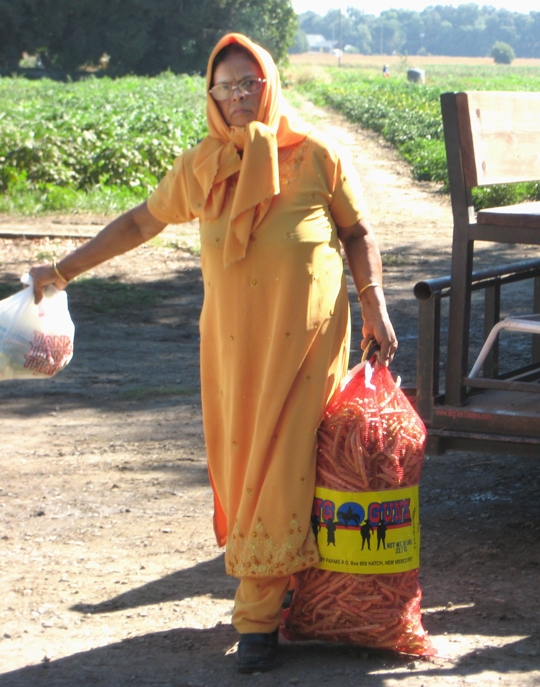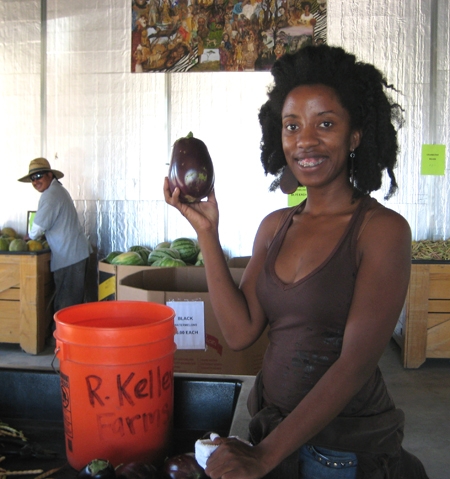Posts Tagged: peas
Fresh picked in the Delta
Last Sunday morning, I drove about 10 minutes out of Sacramento to visit one of my favorite farms and pick some peas. (beans actually, but who cares...) R. Kelley Farm, on state Highway 160 just south of Freeport, is an international gathering-place for lovers of fresh black eye peas, crowder peas, other peas, beans and the fresh vegetables that go well with them. Picking your own gives you the best prices, but ready-picked bins of eggplant, tomatoes, melons, peppers and, of course, beans, fill the airy farm stand. When I arrived, the parking lot was full and the place was jumping.
By 11 o'clock in the morning, Susila Prasab and her family had already picked about a hundred pounds of fresh crowder peas. They climbed off the tractor-pulled wagon that brought them back from the picking field with about five big mesh bags full, ready to get them weighed and pay the Kelley Farm 78 cents a pound. The fresh beans (crowder peas, like black eye peas, are really beans) would soon be shelled, cleaned, blanched and frozen, ready to use as the main ingredient for several months' Indian curry meals. Prasab told me the quick version of her curry recipe.
Quick Indian curry: Like many recipes, it starts with onion, garlic and chili sautéed in a pan with a little oil. Add curry powder and marsala. Wash the shelled fresh beans and add them to the pot. You can add potato or eggplant or tomato or cilantro, or all of them if you want. Add a little water, cook slowly, and serve with rice.
The Prasab family, like most of the others picking fresh black-eye peas, crowder peas and purple beans that morning, were originally from Fiji. The Fijians came from homes in Sacramento, Elk Grove, and even Hayward to pick at Ron and Ella Kelley's 40-acre farm. The farm reminds many of them of Fiji, where they often had small farms or backyard plots, growing their own crowder peas and other vegetables.
Nath Sam, from Fiji by way of Elk Grove, stopped picking purple beans for a few minutes to explain the best way to keep the beans for three seasons in the freezer:
Prepping fresh beans for the freezer: Shell the beans. Boil a lot of water. Throw the beans in for just a few seconds. Take them out quickly and cool them with ice. When they are room temperature, put them in a ziploc bag and seal it tightly. Put bags in the freezer.
R. Kelley Farms is open for picking or buying ready-picked fresh vegetables Wednesday through Sunday, July through October, from 8 a.m. to 6 p.m. On the day I visited, Lynette Hall, the Kelleys' daughter, was at the cash register. Hall told me she was surprised, at first, to learn that so many people all over the world have recipes for black eye peas, crowder peas, okra, and other ingredients for African-American soul-food specialties. Hall was more familiar with her mother's southern-style beans and offered her own recipes for stuffed zuchini or bell peppers and for Sucatosh.
Ella Kelley's fresh beans with turkey: Cook some smoked turkey (necks or legs or whatever you have) until the meat comes off the bone with a fork. Saute onion, garlic and bell pepper. Add the turkey and turkey juice to the mixture. Throw in any kind of fresh shelled beans, black eye, crowder or purple. Cook for about 20 minutes. Serve over rice.
Lynette Hall's stuffed zucchini: Cut a big zucchini squash in half. Scrape out the seeds. Saute onions, garlic and bell peppers with some sausage and hamburger meat. Add some uncooked saffron yellow rice and a couple of eggs to bind everything together. Fill the hollowed-out squash halves with the mixture. Top with a layer of mozzarella cheese and some bread crumbs. Bake at 375 to 400 degrees for about 45 minutes.
Lynette Hall's succotash: Start with meat in a frying pan. When the meat is tender, add the vegetables, using any combination of onions, garlic, okra, peppers, squash, eggplant, tomatoes, fresh beans and corn. Cut the corn fresh off the cob, cutting the kernels half-way through. Then scrape the corn milk off the cob to get the juice. The corn juice adds to the tomato juice to flavor this dish. Season to taste. Serve over rice.
More black eye pea information and recipes.
When I paid for my beans at R. Kelley Farm, I picked up a flier on the counter telling me about fresh pears at Maggi's Farm, just next door. So of course I had to stop by Maggi's for some pears on my way home. But that's another story.
Garbanzos touted as low-cost protein source
The Fresno Bee's ag savvy food writer, John Obra, wrote an article for today's Life section on fresh garbanzos, with information gleaned at a recent UC Cooperative Extension garbanzo bean field day at the UC West Side Research and Extension Center.
High-protein garbanzo beans, also known as chick peas, are most familiar to consumers as dried bagged beans or cooked canned beans. Obra says the green fresh beans will be harvested during the next few weeks and make their way into the produce section of grocery stores.
The article said young, fresh garbanzo beans are so highly sought after, they can be a poacher's quarry. At the field day, UC Davis Cooperative Extension specialist Steve Temple told stories of garbanzo farmers camping on their fields to prevent thieves from ripping up garbanzo plants for prized young, green legumes, Obra wrote.
In addition to offering recipes for using garbanzo beans, Obra's story noted that the legume adds nitrogen back to the soil as it grows.
These and other winter legumes "will definitely have a role 10 to 20 years from now in California agriculture because of low water requirements and nitrogen fixation," Temple was quoted.



